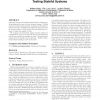280 search results - page 14 / 56 » Hybrid System for Generating Learning Object Metadata |
135
click to vote
RECSYS
2009
ACM
15 years 9 months ago
2009
ACM
In the Netflix Prize competition many new collaborative filtering (CF) approaches emerged, which are excellent in optimizing the RMSE of the predictions. Matrix factorization (M...
149
Voted
ICCV
2009
IEEE
15 years 6 days ago
2009
IEEE
Hybrid generative-discriminative techniques and, in particular, generative score-space classification methods have proven to be valuable approaches in tackling difficult object or...
118
click to vote
NIPS
2008
15 years 3 months ago
2008
Extensive labeled data for image annotation systems, which learn to assign class labels to image regions, is difficult to obtain. We explore a hybrid model framework for utilizing...
129
click to vote
EXPERT
2008
15 years 2 months ago
2008
Natural language technologies have been long envisioned to play a crucial role in transitioning from the current Web to a more "semantic" Web. If anything, the significa...
123
click to vote
GECCO
2009
Springer
15 years 7 months ago
2009
Springer
This paper introduces TestFul, a framework for testing stateful systems and focuses on object-oriented software. TestFul employs a hybrid multi-objective evolutionary algorithm, t...

